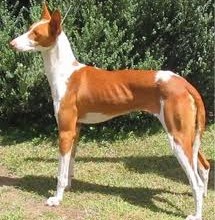Ibizan Hound
Lifestyle Needs

The Ibizan Hound is a Mediterranean hunting dog who works by sight, scent and hearing. He is an agile and tireless hunter who may take off in pursuit of any small prey, including cats. He is a great jumper and hole digger. He can be a devoted companion and family dog but needs expert training and firm handling. The short coat can be either smooth or rough. The Ibizan needs two hours exercise every day but apparently hates wet weather. This is a dog for the specialist.
Genetic Diversity
(Known as Coefficient of Inbreeding: 'COI'. It should be as low as possible.)
The UK Kennel Club breed average COI is 0.0% - See 'A Beginners Guide to COI'
Gene Pool Size
(Known as Effective Population Size: 'EPS')
TBC
EPS is a measure of how many individuals are contributing genetically to a breed population. It is a measure of the size of the gene pool in a breed. Lower than 100 is considered critical by conservationists and below 50 brings a breed close to extinction. For more information see the Kennel Club article.
Health and Welfare Problems due to Conformation
(Body shape and physical characteristics)
- Deafness associated with a lot of white on the head
- Deformation of the corner of the eyes can occur in breeds with narrow skulls and forward facing eyes, causing tear overflow (medial canthal syndrome)
- Gastric dilatation volvulus (GDV) Bloat/torsion
- These fast moving, slender dogs can get injuries (such as leg, toe fractures or pulled tendons) when playing off leash
BVA/KC Health Schemes: www.bva.co.uk/chs
Eye Scheme
Estimated Breeding Values (EBVs) : No EBVs are currently available for this breed
www.thekennelclub.org.uk/about-ebvs
DNA Tests Available
DogWellNet and IPFD Harmonisation of Genetic Testing for Dogs (HGTD)
www.dogwellnet.com/breeds
None known
Availability of a DNA test does not mean that it is always necessary or even desirable for breeders to use this test.
Other Breed-Specific Health Screening Schemes
- BAER (brainstem auditory evoked response)
- Patella luxation test
Ask the breeder to show you the certificates for the above tests/screening for both parents. If any of the above tests have not been considered necessary by the breeder (and there may be good reasons), ask her to explain why.
Other Diseases Reported
(For which there are currently no genetic or screening tests for sire or dam)
- Epilepsy
- Cataracts
- Retinal dysplasia
Ask the breeder about the medical history of the parents, grandparents and great grandparents. Consider carefully whether to purchase a puppy if some of these or other diseases are in the family line.
Ask about the breeder’s policy in cases of serious genetic diseases occurring to your puppy in later life. Good breeders will request to be informed of such events in order to improve future breeding decisions.
You are strongly advised to buy from a breeder who uses (or is prepared to use) the AWF Puppy Contract and Puppy Information Pack (PIP): www.puppycontract.org.uk
The breeder should also be familiar with the CFSG/DBRG Code of Practice for Dog Breeding